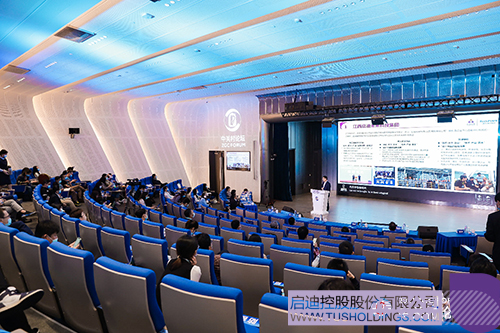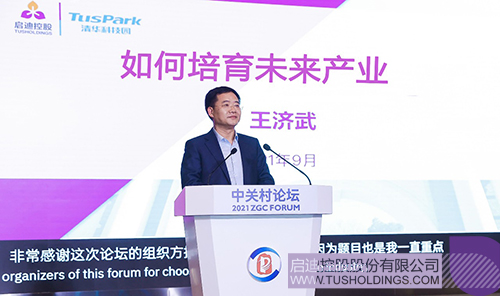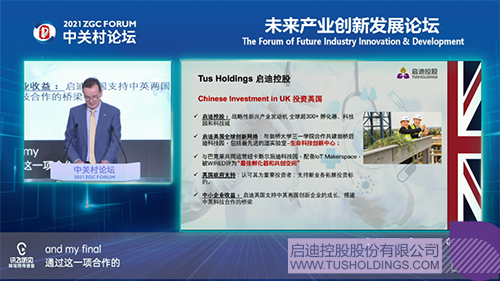

- Press Center

2021 Zhongguancun Forum Opens! Chairman Wang Jiwu Discusses “Future Industry” With GuestsPrint
Post Time:2021-09-24来源:TusHoldings
On the afternoon of September 24, the Future Industry Innovation and Development Forum concurrent with 2021 Zhongguancun Forum was held. Themed with “Future Industry Cultivation and Innovative Development” and focusing on the frontier technology fields, the Forum discussed the cultivation mechanism, development path and innovation policy for the future industry. This forum was hosted by the Torch Center of the Ministry of Science and Technology, Beijing Municipal Commission of Science and Technology, Zhongguancun Administrative Commission and the International Association of Science Parks and Areas of Innovation (IASP), and undertaken by TusHoldings. This is also the third consecutive year for TusHoldings to organize the forum focusing on the cutting-edge technological innovation and development. At the same time, Tus International Technology Transfer Co., Ltd. also participated in the cooperation and undertook the “International Technology Trade Conference” and “Digital Transformation Supply and Demand Matchmaking Conference” under the 2021 Zhongguancun Forum and related work .

Shao Xinyu, Vice Minister of the Ministry of Science and Technology, Yang Jinbai, Deputy Mayor of Beijing, and Ebba Lund, CEO of the IASP attended the forum offline and online and delivered speeches respectively. Jia Jingdun, Director of the Torch Center of the Ministry of Science and Technology, Zhao Yuliang, Academician of the Chinese Academy of Sciences and Director of the National Center for Nanoscience and Technology, and Pan Jiaofeng, Dean of the Institutes of Science and Development, Chinese Academy of Sciences, delivered keynote speeches. Wang Jiwu, Chairman of TusHoldings and the guests from home and abroad discussed the “future industry cultivation and innovative development” in a special report.
In his special report titled How to Cultivate Future Industries, Chairman Wang Jiwu pointed out that, first and foremost, it is necessary to distinguish between future industries and emerging industries. The “future” is sure to be uncertain, with many unpredictable changes. For instance, 20 years ago when the digital economy and digital technology were born in Fujian, they can be understood as future industries. But 20 years later, the digital economy has become a strategic emerging industry. Citing the practices and experiences of TusHoldings in cutting-edge technology cultivation, innovative business incubation and emerging industry development over the past 27 years, he briefly introduced the exploration that TusHoldings has made in terms of “future industry cultivation”. He said that TusHoldings has formulated the “Future Industry Development Plan” years ago and it is the first in China to explore in this respect by establishing Jiangxi Tus-Future Technology Group and Datong Tus-Future Energy Technology Group in collaboration with Jiangxi Province and Datong City, aiming to vigorously develop the future technology industry. With the past four-year exploration and development, our efforts have come to fruition, making positive contributions to the national development in the salt lake lithium extraction, the third-generation semiconductors and the upgrading of clean energy industries.

Chairman Wang Jiwu also pointed out that the future industry must be developed based on the advanced technology, and it must be a globalized technology industry. Whether it is to develop future industries or strategic emerging industries, they must be based on a global collaboration system. TusHoldings has vigorously promoted the global deployment of innovation networks in cooperation with the world-renowned technological innovation regions and institutions. By far, a network of more than 300 innovation bases have been set up, as well as over 200 projects in cooperation with domestic and foreign universities. The innovation ecosystem of TusHoldings has nurtured more than 10,000 high-tech small and medium-sized enterprises. Among them are unicorns and future industries too. They can also be driven by the triple helix innovation mode. The cases in Jiangxi and Datong are very good examples in that the respective roles of universities, enterprises and government are brought into full play. In addition, Chairman Wang also come up with the relevant suggestions on the policy support and scene building for the future industry.

At this forum, Richard Conroy, Counselor of Life Sciences and Medical Health of the British Embassy in China, gave a special report on “British Medical Technology Innovation”. When introducing demonstration projects of Sino-British cooperation, he particularly mentioned the representative cooperation projects undertaken by TusHoldings in the United Kingdom, including Cambridge-Tus Science Park, co-founded by TusHoldings and Trinity College Cambridge, which is equipped with the most advanced laboratories and life technology innovation center. Furthermore, TusHoldings and Barclays are jointly operating Newcastle TusPark, which has the IoT Makerspace, also rated as the “Best Incubator and Co-creation Space” by WIRED in the UK. He said, “It is my hope that in the future, we both can achieve better cooperation in the field of medicine and health, build an effective hub and make it a co-creative space.” With the government supports, more companies from the two countries will benefit from the cooperate between the two countries.
It is learned that the Zhongguancun Forum was founded in 2007 with “Innovation and Development” as its permanent theme. The 2021 Zhongguancun Forum is themed with “Wisdom·Health·Carbon Neutrality”, which is co-sponsored by the Ministry of Science and Technology, the Chinese Academy of Sciences, the Chinese Association for Science and Technology and the Beijing Municipal People’s Government.















